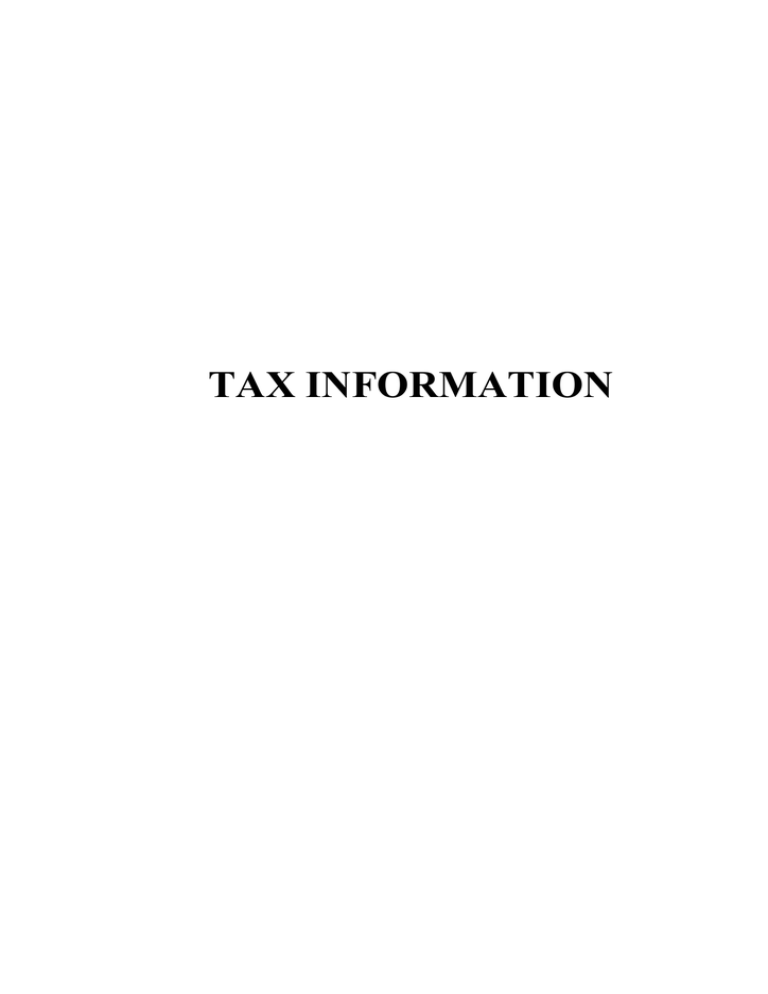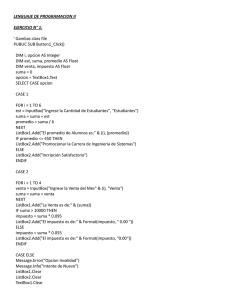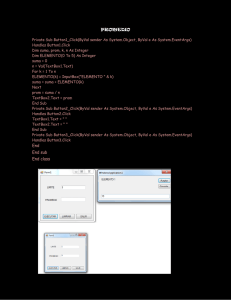Sin título de diapositiva
Anuncio

TAX INFORMATION SUMMARY Suma Gestión Tributaria: •What is Suma? •What does Suma do? Which taxes are payable each year? •The Property Tax (IBI) •The Tax on Economic Activities (IAE) •The Road Vehicle Tax (IVTM) •The Tax on Increase of Value of Urban Land (Plusvalía). Periods of payment. Ways of payment. Fiscal representatives. Some questions about IBI, VEHICLE TAX AND IAE. Some frequently asked questions WHAT DOES SUMA GESTION TRIBUTARIA DO? What is Suma? Suma is a public organisation, which manages and collects local taxes for most of the municipalities in Alicante Province. What does it do? Suma manages, among others, the Property Tax (IBI), the Tax on Economic Activities (IAE), the Motor Vehicle Tax (IVTM), the Tax on Increase of Value of Urban Land (Plusvalía) and Municipal Taxes (Rubbish Collection, Vehicle Access, etc) WHICH TAXES ARE PAYABLE EACH YEAR? * THE PROPERTY TAX (IBI) If you are the owner of a home, garage, plot or land, you have to pay the IBI. * THE TAX ON ECONOMIC ACTIVITIES (IAE) If you have a business, or you carry out professional or artistic activities, you have to pay the IAE every year. * THE MOTOR VEHICLE TAX If you are the owner of a vehicle with a Spanish license number, you have to pay the Motor Vehicle Tax each year. *OTHER MUNICIPAL TAXES: RUBBISH COLLECTION, SEWAGE, VEHICLE ACCESS ETC. If you are a property owner you have to pay taxes for the services rendered by the Town Hall TAX ON INCREASE OF VALUE OF URBAN LAND (CAPITAL GAINS) This is an optional tax for Town Halls, and therefore is not levied in every municipal area. The Town Hall collects this tax as result of a change of ownership of property and it must be paid by the seller, in fact the bills are issued in his/her name. Only in case of donation or inheritance should it be paid by the new owner. Private agreements about who should pay this tax have no effect before the fiscal administration. This tax is levied after the formalisation of the Title Deeds; and to this end the party required to pay must submit a copy of the Title Deeds to his/her Town Hall. For further information about this tax, you should contact your Town Hall. WHEN SHOULD YOU PAY YOUR TAXES? There are two essential payment periods during the year . 1st PERIOD: 2nd PERIOD: MARCH-APRIL AUGUST-SEPTEMBER During this period the following taxes are due: During this period the following taxes are due: * MOTOR VEHICLE TAX *PROPERTY TAX (IBI) * OTHER MUNICIPAL *TAX ON ECONOMIC TAXES: RUBBISH ACTIVITIES (IAE) COLLECTION, SEWAGE, AND OTHERS Dates of payment as well as details of taxes which are due for payment each year are published annually. IMPORTANT: Once the period is over, unpaid bills will be subject to a surcharge. HOW SHOULD YOU PAY YOUR TAXES? 1. BY DIRECT DEBIT If you have arranged direct debit with your bank, Suma will send the bill automatically to your bank which will then provide you with the receipt. How can a direct debit be arranged? When you pay your bill at your bank (Suma-associated bank), you can arrange a direct debit. All you need to do is to fill in the form available on the lower part of your bill and hand it in to the bank. If your Bank or Savings Bank is not a Suma-associated bank or if you wish to arrange direct debit outside the voluntary period of payment, you should go to your Suma office. Contact Suma to check when your direct debit will take effect. 2. AT AN AUTOMATIC CASH DISPENSER With the credit cards of CAM and Caja Murcia and in the 4B Cash Dispensers with 4B, 4B Mastercard and 4B Maestro debit cards. SERVICAIXA Cash Dispensers of “La Caixa”. BBVA. CajaMadrid. You only need the reference number of your bill. If you do not know it, call your Suma office or the English, German and French language information telephone line on 965148561, Mondays, Wednesdays and Fridays from 9 to 12. 3. IN YOUR BANK OR SAVINGS BANK You can pay at any associated bank with the bill sent by Suma to your home address. If you have not received it or have lost it, ask for a copy at your Suma office. On the back of the bill, there is a list of collaborating banks where you can pay. Caja de Ahorros del Mediterráneo Santander Central Hispano Caja Murcia Banco Popular RuralCaja Banco de Valencia Caja Rural Central de Orihuela Banesto Caja Madrid BBVA Caja de Crédito de Altea “La Caixa” Caja de Crédito de Petrer Banco Herrero S.C. de Crédito de Callosa D´Ensarriá Solbank Banco SabadellAtlántico 4. IN SUMA OFFICES BY CREDIT CARD CAM (VISA, Maestro, Mastercard, 6000), BANESTO (VISA, Maestro, Mastercard) and 4B, EURO 6000, and BBVA. Opening hours: from 8.30 till 14.00 from Monday to Friday (the whole year) and on Thursdays from 16.30 till 19.00 *From 1st January to 31st May and from 1st October to 31st December. 5. BY INTERNET You can also pay your bills by Internet. For this you only need to know the reference number on your bill. Web pages: www.cam.es (CAM DIRECTO) www.cajamadrid.es (CAJA MADRID) www.cajamurcia.es www.caixaltea.es www.caixapetrer.com www.bancosantander.es (SUPERNET) www. banesto. es (BANESNET) www.bbva.es (BBVA NET) www.lacaixa.es (LINEA ABIERTA) www.bancopopular.es www.ruralcaja.es www.ruralvia.com Web pages also accessible from: www.suma.es If you do not know the reference number on your bill, come to any Suma office or phone the taxpayer telephone information 96 514 85 61. FISCAL REPRESENTANTIVES Under Spanish Tax Law if you have properties in Spain and you live abroad for more than six months a year, you are required to name a fiscal representative with an address in Spain. Any communication issued by Suma will be notified to the fiscal representative. Representatives are required to give proof of their powers of attorney in Suma. DEPARTMENT OF INFORMATION IN FOREIGN LANGUAGES La Rambla (esq. Plaza San Cristóbal) 03002 Alicante INFORMATION TELEPHONE LINE 96 514 85 61 Mondays, Wednesdays and Fridays from 9 to 12 in English, German and French. www.suma.es SOME QUESTIONS ABOUT THE IBI How is the amount of the IBI bill assessed? The amount to be paid for IBI is calculated by applying the tax rate to the payable base. Example: Cadastral value: 15.000.000 Payment base: 5.000.000 Tax rate: 0,65% Amount to be paid: 5.000.000 X 0,65% = 32.500 ptas The personal information that appears on the bill is not correct. Should you find errors in the personal details of the titleholder of the bill (name, surname, N.I.E., etc), you have only to show your N.I.E. or Passport at your Suma office and the information will be amended on our database. Incorrect information appears in the description of my real estate (incorrect name, house number). You should locate your real estate on the plans that are available in Suma offices, where the appropriate corrections will then be made. Why has the amount of the bill gone up this year? Every year there is a percentage increase in the cadastral value, which is the base for determining the amount to be paid annually, approximately in line with the CPI. (In the case of cadastral review after 1998, the payment base will be updated every year). Town Halls can also modify the tax rate which is applied to the cadastral value to determine the amount to be paid. I do not agree with the cadastral value of my real estate. You should go to the Suma office corresponding to your municipal area. I bought a house and the bill is still issued in the name of the former owner. Go to your Suma office with a copy of the Title Deeds, your N.I.E. or passport and the last IBI receipt and register the change of ownership. It will then take effect as of the following year. I bought a home in March of this year. Do I have to pay IBI? The IBI is an annual tax, and should be paid by the person who is owner of the property on 1st January. I bought a home that had debts on it in the former owner’s name. Can I be held liable for those debts? Under Spanish Law, real estate and homes are liable for the outstanding IBI bills. The new owner can be required to pay if the former owner is declared insolvent. If you wish to avoid problems, before acquiring a new home make sure there are no outstanding, unpaid IBI bills. I bought a newly constructed home, but no bill has yet been issued. When will it be issued? Before a bill is issued, your property has to be included in the Cadastral Register with graphic details (drawn on the plans of land division), physical details (surface area) and economic details (cadastral value). From then on a bill for your home will be issued annually. In some of our offices, we have plans where you can check if your property is included in the Cadastral Register. Contact the corresponding Suma office by phone to ascertain whether this information is available before going there. If it is not, the Cadastral Register has all the provincial documents to help you solve your problem. Suma must be notified of the registration of a newly-constructed property by either the development company or the purchaser using official form 902. I sold my property and the bills still appear in my name. By law, the buyer is obliged to notify the administration of any change of ownership. However if the buyer fails to notify the administration, the law makes provision for the vendor to do so. Go to any Suma office with the documents of sale, and we will change the name of the property holder to that of the new owner. SOME QUESTIONS ABOUT THE MOTOR VEHICLE TAX I have bought a new vehicle. Do I have to pay the Motor Vehicle Tax? Yes. In order to register a car, you have to submit a receipt of an initial tax payment, which will be processed by Suma. In subsequent years, you will pay the annual bill in the established voluntary payment periods. I am going to sell or scrap my vehicle. What should I do in order to ensure bills are no longer issued in my name? Notify the Provincial Traffic Department of the sale or scrapping within 10 days and surrender the “Permiso de Circulación” of the vehicle. My car was stolen. How can I cancel its registration? You must report the theft to the Police or Guardia Civil and ask for a copy of the report in order to apply for duplicate documents of the vehicle. Nevertheless, remember that you must also deregister the vehicle registration at the Provincial Traffic Department. It is not enough to report the theft to the police. I cancelled the registration of my vehicle in the Provincial Traffic Department but I still receive tax bills. What can I do? Submit the cancellation request stamped by the Provincial Traffic Department in any Suma office or in your local Town Hall where vehicle tax management has not been delegated to Suma. If I cancelled the registration in April, do I have to pay the Vehicle Tax for the whole year? The Vehicle Tax, both in the case of registration and cancellation, can be calculated pro rata by quarters. If you deregister the vehicle in the Provincial Traffic Department before the beginning of the voluntary payment period, you should go to Suma or to your local Town Hall, if Suma is not responsible for the management of this tax, with proof of deregistration and request a pro rata calculation corresponding to the first and second quarters. If you deregister the vehicle in the Provincial Traffic Department after the beginning of the voluntary payment period, you will have to pay the full yearly bill, and subsequently apply for a refund of the pro rata calculation for the third and fourth quarters. What procedure must I follow if I have turned my used car over to a car dealer? Within the next 10 days, apply for the temporary deregistration of the vehicle in the Provincial Traffic Department, stating in the request your identity and address, together with the same details of the car dealer. You will also be required to submit the following documents to the Provincial Traffic Department: “Permiso de Circulación”, document of delivery of the vehicle to the car dealer and the last receipt of the Motor Vehicle Tax. As from then you will no longer be the titleholder of the vehicle and the car dealer will appear as its owner, until such time as the vehicle is sold and registered in the name of a third person. I have changed my address. What should I do? Any change of name, surname or address of the titleholder whose name appears on the “Permiso de Circulación” must be reported to the Provincial Traffic Department. If you move to a different municipal area, notify the Provincial Traffic Department and submit a certificate of registration in the census. SOME QUESTIONS ABOUT THE TAX ON ECONOMIC ACTIVITIES What kinds of activities are liable to Tax on Economic Activities? Basically any person who has a business or any self-employed person who carries out any professional or artistic activity is required to pay this tax. How are the most common activities liable under this tax? •Wholesale and retail trade. You must remember that you have to make a separate tax registration for each of your premises. •Travelling sales. You are required to register in each municipality in which you carry out this activity. •Restaurants, cafeterias and bars. You must register each separate establishment. • Real estate agencies: You must register in the Municipality where you have your offices. Specific information about other activities will be provided in Suma offices. When must you present a registration form? The registration form must be submitted in any Suma office, during the 10 working days prior to the beginning of the activity. Is it necessary to declare an activity every year? No, once you begin the activity and declare the registration, a yearly bill will be issued at the appropriate time. It is not necessary to declare the activity every year. Is it necessary to submit any declaration once you cease the activity? A declaration of deregistration must be submitted within a month of cessation of the activity. Your annual bill will be pro rata calculated, and you may be entitled to a refund of part of the bill. Is the interested party required to submit the registration form in person? It is not necessary to appear in person if authorisation is granted to another person on the registration form. Is there any fiscal benefit for those carrying out an activity for the first time in Spain? Yes, when the municipality concerned has made provision in its tax regulations. Applications should be made on the registration form. SOME FREQUENTLY QUESTIONS ASKED The bill has not been debited to my account although I have arranged direct debit. If your direct debit order has not taken effect, you must submit a claim to Suma attaching the direct debit order signed at the time it was arranged, to facilitate an investigation into the reasons. The voluntary payment period is about to finish and I have not received my tax bill. Contact your Suma office to ensure you have not arranged direct debit. If this is not the case, you should go to any Suma office to obtain a duplicate copy of the bill or ask for the reference number which will enable you to pay at a cash dispenser or by means of an electronic banking service. I will not be in Spain during the voluntary payment period. The best way to overcome this problem is to arrange direct debit for the payment of your bills. Otherwise you can name a representative to deal with your fiscal obligations. I paid the same bill twice. How can I recover my money? You should apply for a refund of the amount of the second bill, submitting the receipts of the payments made and details of the bank account in which you wish to be reimbursed. Where do I have to pay the Income and Patrimony Tax? You should go the Ministry of Hacienda as it is a national tax managed by this administration. Is it possible to deal with my local taxes in any Suma office? You can present your declarations, obtain demands of payment and ask for general information about taxes that Suma manages in any Suma office. Where do I have to pay Income and Capital Gains Tax? You should go the Ministry of Hacienda as these are national taxes managed by the public treasury. Is it possible to deal with my local taxes in any Suma office? You can submit your declarations, obtain payment documents and request general information about taxes that Suma manages in any Suma office.


